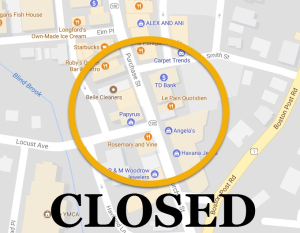Holding Court: Death & Taxes
Holding Court is a new series by retired Rye City Court Judge Joe Latwin. Latwin retired from the court in December 2022 after thirteen years of service to the City.
What topics do you want addressed by Judge Latwin? Tell us.
By Joe Latwin

Nothing is certain but . . .
“[i]n this world nothing can be said to be certain, except death and taxes”. Benjamin Franklin [1789] but originally Christopher Bullock [1716]. But what happens if you don’t pay your taxes?
In Rye, we pay our real estate taxes to the County, City and School Districts. If you don’t pay them, they become a lien on the property. Usually the taxing authority will, after notice, sell the lien. The lienholder can at some point foreclose the lien and force a sale of the property and collect from the sale proceeds.
Upon a judgment of foreclosure, the mortgagee (the bank) will buy the property for the amount of the mortgage to protect the bank’s interests. Depending on the upon the properties value, others may come in and bid. What if the property is sold for taxes, but the proceeds well exceed the taxes owed? The U.S. Supreme Court answered this question last month.
Ms. Tyler owned a condominium in Minnesota, that accumulated about $15,000 in unpaid real estate taxes along with interest and penalties. The County seized the condo and sold it for $40,000, keeping the $25,000 excess over Tyler’s tax debt for itself. Ms. Tyler filed suit, alleging that the County had unconstitutionally retained the excess value of her home above her tax debt in violation of the Takings Clause of the Fifth Amendment and the Excessive Fines Clause of the Eighth Amendment. The District Court dismissed the suit for failure to state a claim, and the Eighth Circuit affirmed.
The Supreme Court found while the County had the power to sell Ms. Tyler’s home to recover the unpaid property taxes, it could not use the tax debt to confiscate more property than was due. Doing so effected a “classic taking in which the government directly appropriates private property for its own use.”. The principle that a government may not take from a taxpayer more than she owes is rooted in English law and can trace its origins at least as far back as Magna Carta.
From the founding, the new Government of the United States could seize and sell only “so much of [a] tract of land . . . as may be necessary to satisfy the taxes due thereon.” Ten States adopted similar statutes around the same time, and the consensus that a government could not take more property than it was owed held true through the ratification of the Fourteenth Amendment. Today, most States and the Federal Government require excess value to be returned to the taxpayer whose property is sold to satisfy outstanding tax debt.
So after probably paying a large sum for attorneys’ fees and court filing fees, Ms. Tyler was entitled to return of about $15,000. Was it worth it?
How about a useful tip? If your property is being sold at foreclosure, the debtor has the right to bid. If you owe $100,000 on the mortgage or in taxes, the debtor can bid less than that amount. If that bid is the highest bid, they get the property free of the lien for less than the amount owed! Of course, the value of the property is key – if the property is worth $1 million and the debt is $1,000, a $1,000 bid will not likely be successful but the numbers could work in your favor.
Lesson: pay your taxes, don’t risk losing your home, and avoid the embarrassment of having your name published in the press as not having paid your taxes.






